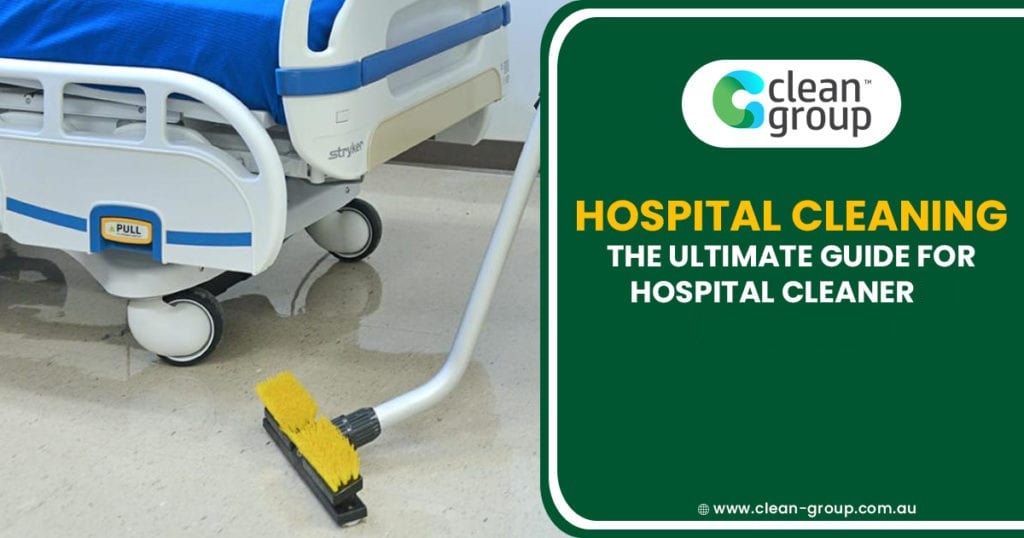It is common knowledge that medical institutions, especially hospitals, follow the highest standard of cleaning and sanitation. A lot of patients, visitors, employees, and other people coming to and fro can be exposed to cross-contamination and other diseases.
Study shows that a clean and well-sanitized hospital increases patient recovery rates. Clean Group commercial cleaning Sydney offers the highest standard of medical and hospital cleaning all across Sydney.
We had proven the quality of our work through various health clinics, hospitals, mental health facilities, and many more.
Being in the cleaning industry for over two decades, we encountered many ups and downs and had gone through trials and errors to see which practice works and which does not.
In this hospital cleaning guide, we will share with you how we were able to secure hospital cleaning contracts and how do we manage to keep them all satisfied. Let’s get started.
Hospital Cleanliness Impacts Overall Patient Experience
Hospitals are different than other kinds of businesses when it comes to cleaning and disinfecting. The reasons for this include:
- Bad germs in this kind of setting are more common. The germs are often difficult to remove or kill. Germs are invisible which makes it very hard to know if the hospital cleaner has been successful in their cleaning practices.
- Patients and residents who stay in hospitals and other health care facilities are often ill, elderly, and debilitated. This makes them more likely to catch infections. Patients also have many more chances to be exposed to the germs that are found in their surroundings since they have frequent contact with health care workers.
- One fact that you need to know is that the hands of the health workers are the most common way that the germs can travel around medical facilities.
Clean Group Sydney medical cleaning includes cleaning, disinfecting, and preparing the environment of the entire facility. Cleaning ensures that the whole premise is safe for patients, visitors, and staff members.
Clean Group cleaners have been trained by our Cleaning Supervisors on how to properly clean and disinfect patient’s rooms.
Clean Group cleaners have to demonstrate the proper techniques they have learned before they were allowed to work independently. We ensure that the rooms are clean after the patient has been discharged.
We prepare the clean the room thoroughly to prevent the transfer of any germs left behind from the previous patient to the next new patient.
Facts About Hospital Cleanliness
- 1 in 20 patients gets infected from unsupervised hospital cleaning
- Hospital bugs multiply faster because they are 40% antibiotic-resistant. Hospital’s pharmacy had allotted 20% of their budget for treating these hospital bed bugs.
- Dirty hands and poor disinfection practices are the top reasons for infection.
Cleanliness becomes a target of improvement to many hospitals because patients are highly likely to recommend a hospital that they perceived to be clean.
Apart from cleanliness, patient’s loyalty also depends on how a hospital can deliver a safe, utmost quality, and effective care through a reduced risk of infections acquired in the hospital.
Where Are the Dirtiest Places in Your Hospital?
We all have the impression that a hospital is always clean and spotless. Do you know that germs and bacteria can hover, hide, and fester in the least expected places? This is why Hospital Cleaning Sydney ventured into health care facility cleaning.
It is our advocacy to provide safe and clean hospitals to people who may be in need of medical care. Please continue reading as we expose the five dirtiest places and spots that you can find in a hospital.
Hands – hands are the main reason why the following dirt contributors will land on their spot. Dirty hands touched them passing germs and bacteria from one place to another.
Hospitals are known to follow strict handwashing protocols to prevent bacteria and germs from spreading. Doctors and nurses are also expected to clean or wash their hands each time they interact with patients.
Handwashing or sanitation stations can be found in almost every door of the hospitals. These are available for doctors, nurses, and visitor’s use to fight contamination.
Bed Curtains or Partitions – Hospitals put curtains around the bed to provide privacy and comfort to patients. Curtains are not intended to have direct contact with people but there are many instances that these curtains catch germs and bacteria that can, later on, contaminate the space and affect the health of the patient.
These curtains are not replaced as often and get laundered as frequently as the linens.
Elevator Buttons – Human traffic can be heavy in the elevator. Doctors, nurses, patients, visitors, and all other people who use the elevator. People who work in the hospital practice handwashing routine but the majority of the population who use the elevator do not.
Think of the accumulated germs that are already seated at each button. Plus, the elevator is not on the list of priorities when it comes to cleaning.
Computer Keyboards – Like in the office setting, hospital’s computer keyboards are notorious when it comes to dirt, germs, and bacteria.
Doctors, nurses, and other health workers use the keyboard to track the progress of each patient. Most of the time, this computer is operational in a 24-hour shift being used by one nurse to another. Honestly, these computer keyboards are not even wiped down at least once a day.
Mobile Phones – we touch our phones many times in a day. Screens and phone buttons are breeding grounds for germs and bacteria.
We are often not as mindful as the other health workers in following handwashing protocols. It is a good practice to wipe the phone screen with disinfecting wipes once in a while too.
Keeping Hospitals Clean and Safe Without Breaking the Bank
Maintaining the hospital’s cleanliness is crucial. Studies show that keeping the overall hygiene of the hospital environment helps fight infection. Hospital Cleaner Sydney had designed a platform for cleaning professionals.
The platform is designed to summarize the knowledge and create awareness. It prioritizes the development of hospital hygiene and environmental control.
We all understand that hospital hygiene is more complex as compared to other types of cleaning. Clean Group Sydney provide cleaner’s education like training and career development.
We reevaluated how hospitals view their environmental hygiene to understand how our services can add value to the overall well being of all the patients and people working inside the hospital.
Cleaning as Initiative to Safety
Clean Group makes sure that every room is cleaned well and sanitized. We all understand that no one wants to be in a contaminated room. Contamination can easily be combated by simple handwashing protocols.
Hands are the main vectors for spreading infections and diseases. We practice handwashing as often as we could to make sure that germs and bacteria are being washed off before touching anything inside the room. Clean Group knows the process of disinfection methods.
Logistics of Hospital Cleaning
The process of logistics in hospital cleaning involves assigning tasks to each and every person that is responsible for keeping the hospital clean and safe.
Nursing assistants are expected for cleaning one part of the patient’s environment while the hospital cleaner is in charge of the overall cleaning of the hospital.
Each person needs to know which area are they assigned for. Assigning areas to people is important so as not to miss a spot that needs to be cleaned regularly.
Cleaning in Healthcare
Hospital cleaning is purely dependent on the pathogens that are present in the environment and the chemicals and cleaning agents that are used by the cleaners to clean the area.
5 Main Variables in Hospital Cleaning:
- What products and cleaning chemicals are applied?
- What are the techniques and equipment used to apply the product?
- Which surface was it applied to?
- What is the contamination level of the environment?
- Who does the cleaning?
These main variables should always be present. Otherwise, the cleaning will be considered substandard. Maintaining hospital cleanliness not only talks about removing dirt, dust, and soil. We also take patient’s safety into account at all times.
Training and Communication
Hospitals have ranges of environments. Cleaning the office inside the hospital is different from cleaning the intensive care units. Some of these rooms and areas require specialized approaches.
Cleaners should understand that there are different requirements for different sectors within the same department too. Patient’s vulnerability to pathogens is the primary concern why hospitals must hire a professional cleaner.
Cleaning Products
Alcohol, chlorine, hydrogen peroxide, and ammonium compounds are the common cleaning agents being used in disinfecting hospitals. These products are ideal to fight germs, bacteria, viruses, and spores.
They are also known to be safe in the environment and easy to use. Always take into account that chemicals and cleaning agents are useless if not used properly.
The Human Component
Attention to detail is one of the valuable traits of a hospital cleaner. Cleaning cannot be dependent on chemicals alone. The person who does the cleaning should be meticulous enough to identify what are the areas that he or she needs to focus on.
He should know the right methods, techniques, cleaning materials, chemicals, and equipment to simplify the job. Hospital cleaning Sydney makes sure that all cleaning professionals have certification. We trained our cleaners to make them understand why they hold a very important place in the hospital.
What Skills Does a Hospital Cleaner Needs?
A new cleaner gets their training by observing and helping a tenured cleaner on the job. Hospitals have high demands for cleaning casualties because of the nature of their business.
Basically, hospital cleaners need to have the same qualification as those who do the cleaning in commercial businesses.
Only that, they have to be well-versed on how cleaning and disinfecting plays an important role in hospital cleaning. The cleaners need to put the patient’s safety as their priority.
Physical Skills
The cleaner has to be healthy and has strong stamina. Cleaning may require you to carry and lift things. Cleaners mostly spend the whole day cleaning on their feet, pushing, lifting, and moving equipment.
It is a must that a cleaner has good eyesight for him to see what he is doing and to read the instructions on the chemical’s labels.
Basic Cleaning Skills
Hospital cleaners have to know how to perform basic housekeeping tasks. They need to know how to get rid of dust and polish floors. They are also expected to know the basics of cleaning the rooms, toilets, hallways, and common areas. Cleaners also look after trash collection.
Safety and Sanitation
Hospital cleaners are trained to know the proper usage of chemicals and disinfectants for it to work effectively. They should know how to follow the hospital’s rules and procedures on safety.
Attention to detail is very crucial in a hospital set up. The cleaners are expected to be alert to dangers and hazards and they need to report it immediately.
Interpersonal Skills
The cleaners need to know how to communicate to be able to work effectively with other people working in the hospital. They should be compassionate enough as some patients may talk to them.
The cleaners must know how to communicate in English so that reading labels and understanding them will not be a challenge.
Do you agree with this hospital cleaning guide?
Please feel free to let us know how you feel about it. Please write your comments and questions below and let us help you out in becoming successful in the hospital cleaning business.

